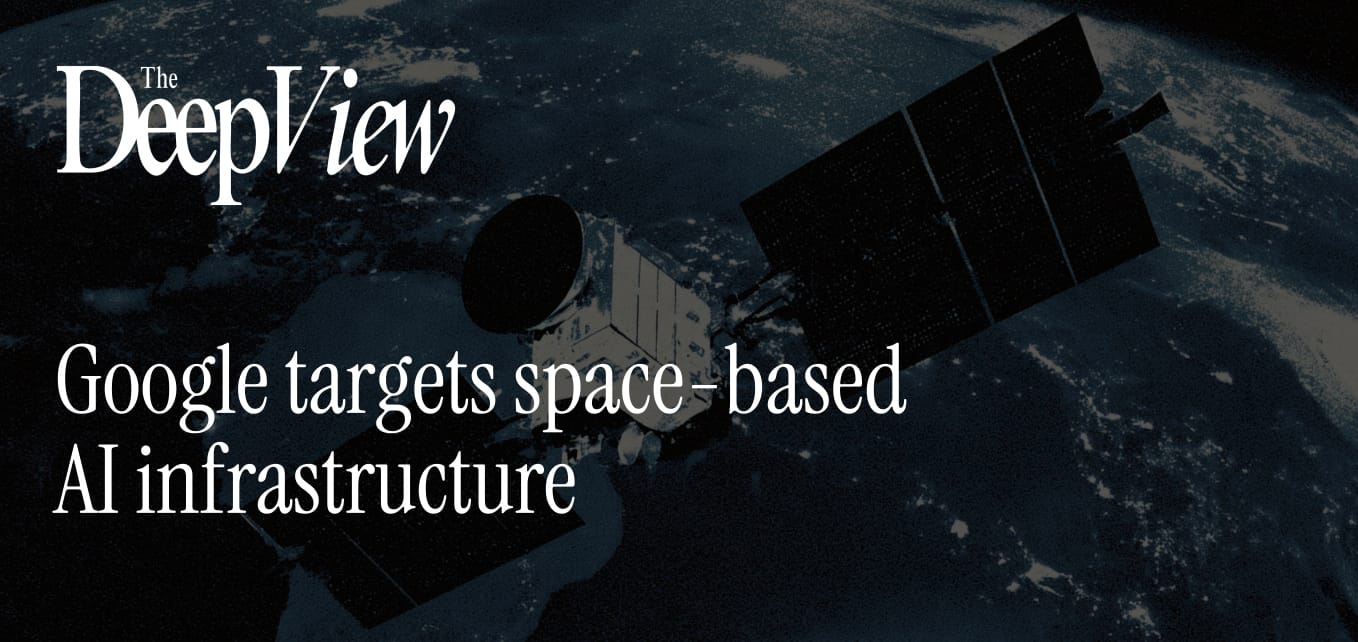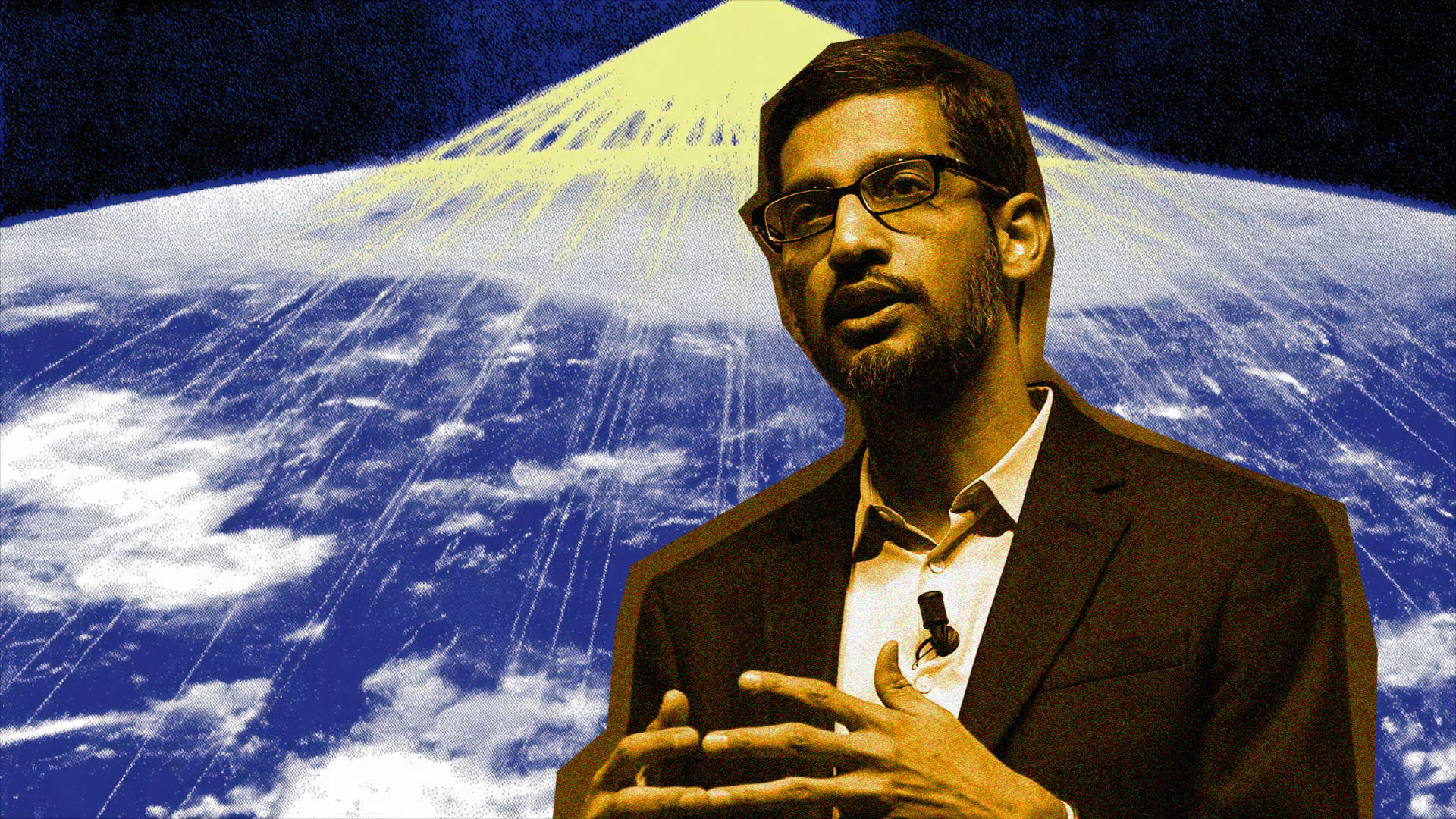- The Deep View
- Posts
- Google targets space-based AI infrastructure
Google targets space-based AI infrastructure

Welcome back. Perplexity and Amazon are putting up their dukes. The e-commerce giant has sent legal threats to the AI startup, warning the company that its agentic shopping assistant violated Amazon’s terms of service by failing to identify itself as an AI agent. Perplexity responded by publishing a blog post titled “bullying is not innovation,” calling out Amazon for leveraging “intimidation to block innovation and make life worse for people.”
1. Google targets space-based AI infrastructure
2. Stability wins Getty copyright lawsuit
3. AI firms target professional services
HARDWARE
Google targets space-based AI infrastructure

Google is looking towards the cosmos to meet AI’s energy demand.
On Tuesday, the tech giant unveiled Project Suncatcher, an initiative to scale AI compute in space. The goal is to harness the power of the Sun via satellites in orbit and minimize the impact of AI infrastructure on “terrestrial resources,” the company said.
The initiative will equip “solar-powered satellite constellations” with Google’s Tensor Processing Units and inter-satellite links, keeping them in constant view of the sun in low-earth orbit to run on solar power perpetually. The first two prototype satellites for the project will be launched in 2027.
Google noted in its research paper that a solar panel can be eight times more productive in orbit than it is on Earth if placed in the proper orbit. “In the future, space may be the best place to scale AI compute,” Travis Beals, senior director of Project Suncatcher, wrote in the report.
Our TPUs are headed to space!
Inspired by our history of moonshots, from quantum computing to autonomous driving, Project Suncatcher is exploring how we could one day build scalable ML compute systems in space, harnessing more of the sun’s power (which emits more power than 100
— Sundar Pichai (@sundarpichai)
5:01 PM • Nov 4, 2025
Google’s initiative isn’t the first time we’ve seen companies seek creative solutions to AI’s energy and resource problems.
Microsoft, for example, has filed a number of patent applications for inventions in recent years for systems that rely on cryogenic power, or cold energy, to power data centers.
Nvidia, meanwhile, has partnered with Starcloud, a company that aims to deploy data centers in space, which on Monday launched its first satellite equipped with an Nvidia GPU.
Given the increasing competition among tech giants to accelerate AI development, the pressure is on to figure out how to fuel that growth.
“Moving some processing off-planet might ease the load on Earth’s power systems, but it also highlights a larger issue: as AI scales, careful planning for sustainable energy use becomes essential across the whole AI infrastructure,” Roman Eloshvili, founder of AI compliance firm ComplyControl, told The Deep View.

It’s no secret that AI is an energy hog. Global energy demand from data centers – driven largely by AI – is expected to double by 2030, according to the International Energy Agency, with a growth rate of around 15% per year, or four times faster than the growth of total electricity demand from all other sectors. Still, tech companies continue to throw astronomical amounts of cash at massive AI infrastructure buildouts. Given the sheer energy demand of these facilities, whether energy infrastructure – clean or otherwise – can keep up remains unclear.
TOGETHER WITH OUTSKILL
2025 has been a wild year — the toughest job market and the fastest rise of AI.
But it’s not too late to get ahead. In just 2 days, you can learn the most in-demand skill of the decade.
Join Outskill’s LIVE 2-Day AI Mastermind — 16 hours of hands-on training to help you work smarter, earn more, and reclaim your time.
Rated 9.8/10 on Trustpilot, it’s designed to turn you into an AI generalist who can build, automate, and solve anything — instead of being replaced by it.
🧠 What you’ll learn:
Build AI agents that save 20+ hours weekly
Master 10+ AI tools professionals charge $150/hr to use
Automate 80% of your workload and scale your income
Learn LLMs and master prompt engineering
Create high-quality AI images & videos for marketing and content
💼 Learn the same AI playbook Fortune 500 companies use to automate workflows and 10x revenue
📅 Live this Saturday & Sunday
🕙 10 AM – 7 PM EST
💰 Usually $395 — FREE for Black Friday!
🎁 Plus, unlock $5,000+ in AI bonuses: prompt bibles, an AI monetization roadmap, and your personalized toolkit builder.
POLICY
Stability wins Getty copyright lawsuit

AI firms have notched another copyright win.
Stability AI largely won in its intellectual property legal battle against Getty Images, Britain's High Court ruled on Tuesday. Though a judge ruled that Getty narrowly prevailed in its argument that Stability infringed its trademark, it lost the secondary claim that the AI firm infringed its copyright.
Getty had initially claimed that the AI firm’s Stable Diffusion image generation tool was a “brazen infringement” of its library. Though Getty said the ruling was a “significant win” for IP owners, Stability’s General Counsel Christian Dowell told ABC News that the decision resolves the “core issue” of copyright.
The ruling comes amid growing tensions between AI firms and copyright holders. The launch of OpenAI’s Sora in late September has already incensed many Hollywood hotshots, with major agencies opting to keep their clients off the platform and SAG-AFTRA decrying the growing deepfake problem.
But the tides may be turning in the favor of model developers, and Stability’s win isn’t the only sign. Last week, Universal Music Group, one of the industry’s most prominent record labels, settled its copyright lawsuit against AI music platform Udio, opting instead to partner with the startup. UMG also announced a partnership with Stability to develop “responsibly trained” AI music creation tools.
These partnerships and legal settlements could signal that if creative firms can’t beat the growing movement towards AI in the artistic process, they may simply have to join it.
TOGETHER WITH SONAR
7 habits of highly effective AI coding
Is your development team truly harnessing AI's power without compromising code quality or security?
Discover the 7 essential habits you need to confidently adopt AI coding, reduce toil, and ship secure, high-quality software. Read this ebook from Sonar to learn how to:
Boost real engineering productivity and velocity, not just code volume.
Ensure AI-generated code is secure, reliable, and maintainable.
Foster a culture of developer accountability.
ENTERPRISE
AI firms target professional services

AI companies may see professional services as their cash cow.
Earlier this week, Anthropic announced a partnership with IT consulting firm Cognizant, deploying the company’s Claude models and agentic tools to up to 350,000 associates across its organization. It’s the third deal of its kind that Anthropic has made in the past month, scoring partnerships with IBM and Deloitte in early October.
“Enterprises are moving beyond simple productivity gains toward a more connected, agentic future,” Ravi Kumar S, CEO of Cognizant, said in the announcement.
And Anthropic isn’t the only firm targeting professional services. Legal AI startups like Harvey, Eve and Filevine have all scored significant funding and sky-high valuations in recent months as investors see massive potential in alleviating the tedium of these industries.
But actual utility among these industries runs a wide gamut. In the legal field, for example, adoption of generative AI is trending slowly: According to data from Bloomberg Law, only 21% of attorneys report using generative AI “about once a day.”
A survey of more than 650 lawyers from the Association of Corporate Counsel published in mid-October found that nearly 60% of in-house counsel have seen “no noticeable savings yet” as a result of their AI deployments.
Consulting, meanwhile, is being fundamentally upended by AI, with some arguing that AI could entirely replace those jobs. Some firms are already trimming headcount as a result of AI, such as Accenture, which said in September that it had laid off 11,000 workers who couldn’t be reskilled for AI tasks.
In an essay published last week by Enrique Dans, a professor of innovation at IE University, he noted that consulting forms are “not losing tools, they are losing their monopoly on knowledge.”
“AI has democratized access to information, models, and methodologies that previously justified hiring an external firm,” Dans wrote.
LINKS

Amazon to deploy Fastnet, a subsea internet cable, from Maryland to Ireland
Anthropic projects $70 billion in revenue by 2028, The Information reports
A16z pauses its Talent x Opportunity fund for underserved founders
Sequoia Capital elevates Alfred Lin and Pat Grady to firm stewards
Nvidia strikes data center deal with Deutsche Telekom worth more than $1 billion
Apple will reportedly use a custom Google Gemini model to power Siri
IBM to cut a “low single-digit percentage” of its global workforce

Cognition Codemaps: A new AI-powered feature for Windsurf for context-aware code suggestions.
ClickUp Agents: ClickUp has added two new AI assistants, one for communication and another for general-purpose tasks.
Tembo: A single user interface for coding agents, allowing users to make and execute engineering tasks across their tech stacks.
Generalist Gen-0: A new, 10 billion parameter foundational model built for robots.
Fal Bytedance Video Upscaler: Improves video quality to 1080p, 2K, and 4K resolution.

A QUICK POLL BEFORE YOU GO
Do you think taking AI off-planet the future, or a distraction from fixing Earth’s energy problem? |
The Deep View is written by Nat Rubio-Licht, Faris Kojok, and The Deep View crew. Please reply with any feedback.
Thanks for reading today’s edition of The Deep View! We’ll see you in the next one.

“Looked like too low a ceiling in AI” “The real image looked so AI, but the copter in the fake image is flying between buildings, not above them. The model must've been trained on video games.” “The helicopter in [the other image] is below the rooflines of the buildings. Flying at that level would be difficult with the lack of lift that is required.” |
“There's a shadow on [the other image] that doesn't make sense.” “Being a painter, one of the most difficult things to render realistically is lighting and shadow. I think [the other image] has some incongruencies of lighting on the helicopter” “I've never seen a helicopter with 3 blades” |

Take The Deep View with you on the go! We’ve got exclusive, in-depth interviews for you on The Deep View: Conversations podcast every Tuesday morning.

If you want to get in front of an audience of 450,000+ developers, business leaders and tech enthusiasts, get in touch with us here.






